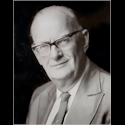Arthur C. Clarke
December 16, 1917 - March 19, 2008

The British author, inventor, and futurist, Arthur C. Clarke, is best known for writing short stories and Science Fiction novels and hosting his own television series.
Clarke lived on the farm as a child and enjoyed stargazing and reading old American Science Fiction pulp magazines. During World War II, Clarke joined the Royal Air Force where he was a radar instructor and technician. He played a key role in early warning radar defense systems and reached the rank of flight lieutenant. Following the war, Clarke received a first-class degree in mathematics and physics at Kings College London. Clarke continued to make important contributions to technology in his non-fiction writings positing that geostationary satellites would be ideal telecommunication relays.
Clarke's first published short stories appeared in fanzines and Science Fiction magazines. He went on to write a number of novels and short story collections including 2001: A Space Odyssey and its sequels, Rendezvous with Rama and its sequels, and Childhood's End. Clarke's views on religion and spirituality and his optimistic view of science can be seen throughout his writings. In addition to fiction, Clarke also wrote non-fiction and magazine essays. In these essays, he formulated "Clarke's Three Laws" of prediction and predicted technological advances that would occur in the future. Clarke also hosted three British television series about unexplained phenomena and the paranormal in the 1980's.
In addition to writing, Clarke enjoyed scuba diving resulting in him emigrating to Sri Lanka for the remainder of his life. Clarke was a mentor for the Underwater Explorers Club, discovered underwater ruins, and received Sri Lanka's s highest civil honor. Clarke also received a myriad of other awards and honors including being nominated for a Nobel Peace Price and being knighted by Queen Elizabeth II for his services to literature. Clarke was an amazing and influential man in addition to a Master of Science Fiction.
See bibliography: Arthur C. Clarke